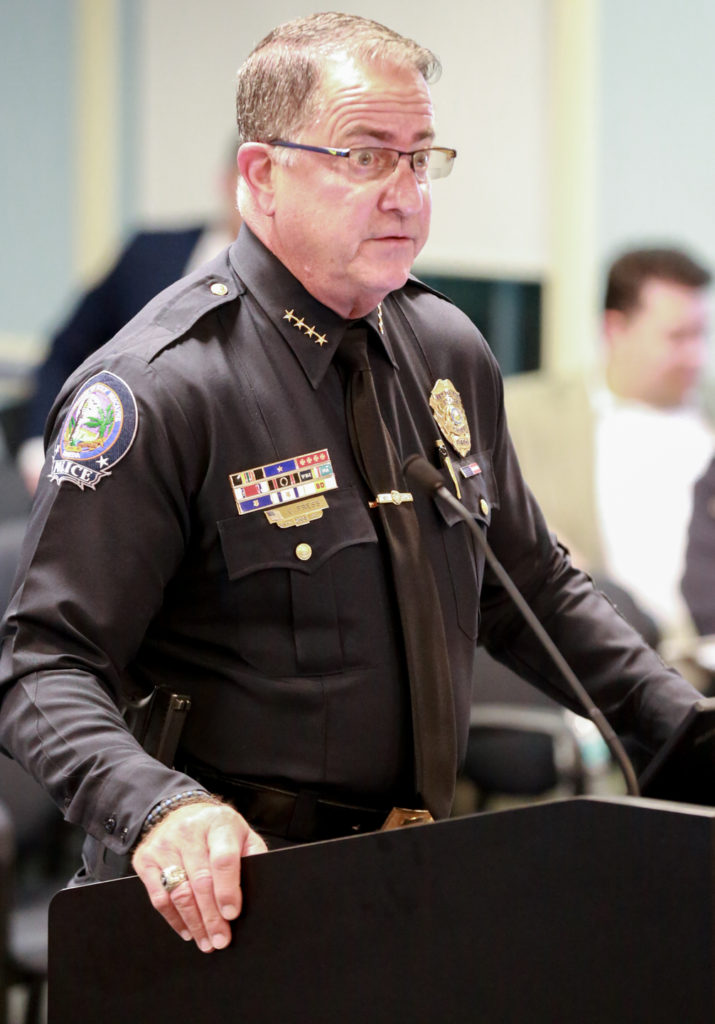Key Biscayne Policing Scrutinized at Council Meeting
Annali HaywardNovember 21, 2019

Police Chief Charles Press briefs members of the Village Council in this photo from March 2019. (Key News/Tony Winton)
Tuesday’s Council meeting featured an occasionally uncomfortable exchange between a Council member and the Key Biscayne Chief of Police over department policies.
Chief of Police Charles Press expounded on his department’s operations at the Village Council meeting Tuesday after a spate of car thefts over the summer gave rise to a political discussion.
Press was responding to Council Member Luis Lauredo, who wanted his agenda item (a “review of police policies and practice”) to happen at the last meeting, but Press was away. The delay did nothing to quench Lauredo’s thirst for knowledge as, after an introductory speech, the former US Ambassador grilled Village Manager Andrea Agha and Press on the specifics of policing procedures, including exactly what Key Biscayne police can and cannot do when they identify and chase suspects both in and outside Village bounds.
Lauredo, who was a member of the first Village Council in 1991, wanted to be able to direct the police department to continue car chases on the Rickenbacker Causeway, repeatedly asking for what the “cutoff” point is for cops to stop pursuit.
But car chases are not allowed for property theft, a point Agha repeatedly tried to make. Lauredo seemed to take exception to her insinuation (however inadvertent) that his suggestion would amount to operating outside of the law.
The Chief spoke at length about a 19-page policy detailing the proper procedures and the reasons why car chases are too dangerous to be worth potential loss of life for a property crime. He outlined some new technologies that may help in future, such as a ‘dart gun’ that pierces cars with a GPS marker, and a communications strategy that would alert locals there is a police chase underway so they can get out of the way – although these are not slated for deployment yet.
Council Member Katie Petros thanked Lauredo for bringing up the issue, because “it’s not always easy to have these discussions, as the no-chase policy is counterintuitive at first – but it’s important for the community to understand this.”
She said our policies should be about how we work together to pre-empt and prevent crime in the first place, a point Council Member Segurola echoed: “The room for improvement is before a crime is committed, not after. I completely disagree that we need to change our chase policy for a property crime.”
Council Member Ed London spoke up “one thousand percent” supporting Press, “even though sometimes we disagree.” However he did say he understood Lauredo’s frustration.
Lauredo, sensing he was outnumbered, said the argument was borne of his sense of duty to “these people,” referring at once to residents at large as well as the particular victims of the car thefts who spoke at the Council meeting Aug. 27.
“We cannot have these life and death policies without us being involved,” he said.
Positive action appeared when it was suggested a Town Hall would help residents understand this and other police initiatives, such as the plans to implement a better system of traffic flow on the Rickenbacker Causeway in the event of another road closure, such as that which resulted after a recent tragedy in which a Key Biscayne woman died.
“We are expediting that plan,” said Press, who also explained the Village would in future communicate more with residents in similar circumstances, “even if there’s not much to say.”
Mayor Mike Davey thanked Press for the “visibility” he emphasizes within his police force, including a new bike program for officers (training for which was underway earlier this week).
Vice Mayor Allison McCormick asked that any such workshop should include issues such as the flashing lights on Crandon Boulevard (which many residents feel are inadequate) and the use of golf carts by underage drivers as well as general enforcement of golf cart regulations.
“You and your officers have our total support,” she said.
The discussion took a political turn when Lauredo moved on to the subject of profiling.
Taking an example of an officer who sees a car full of young people driving around Mashta Island late at night, Lauredo wanted to know what that officer, who “may or may not be able to see their skin color, whether it is blue, green or black,” can do.
“Do you have latitude in the law to take action?” asked Lauredo. “I am very liberal but we cannot be trapped on ‘profiling.’”
“The answer is yes,” said Press. “Because that’s not profiling, it’s proactive police work.”
Lauredo, much comforted by Press’s response, said “anybody that suggests otherwise is suggesting that we do something illegal, which is preposterous.”
Agha and Press will suggest dates for a Town Hall at the Dec. 10 Council meeting.


